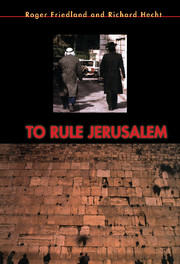Book contents
- Frontmatter
- Contents
- List of Illustrations
- Preface
- Acknowledgments
- Introduction
- 1 A Fearful Fusion
- Part I The Two Zions: Jews Against Zionism in Jerusalem
- Part II Zion Divine: Jerusalem as the Messianic Central City
- Part III Birth of a Nation
- 11 Platform for Palestine
- 12 Zion for Palestine
- 13 A State of Mind
- 14 The Islamic Challenge
- 15 Baghdad, Berlin, and Jerusalem
- Part IV Heart of Stone
- Notes
- Index
14 - The Islamic Challenge
Published online by Cambridge University Press: 13 May 2010
- Frontmatter
- Contents
- List of Illustrations
- Preface
- Acknowledgments
- Introduction
- 1 A Fearful Fusion
- Part I The Two Zions: Jews Against Zionism in Jerusalem
- Part II Zion Divine: Jerusalem as the Messianic Central City
- Part III Birth of a Nation
- 11 Platform for Palestine
- 12 Zion for Palestine
- 13 A State of Mind
- 14 The Islamic Challenge
- 15 Baghdad, Berlin, and Jerusalem
- Part IV Heart of Stone
- Notes
- Index
Summary
Within an hour of King Hussein's speech relinquishing the Hashemite claim of sovereignty over the West Bank, Israeli intelligence officers accompanied by police and soldiers drove from the Russian compound, its walls looped with concertina wire, to Faisal Husayni's home and ultimately to the Arab Studies Center, Husayni's research organization. Husayni's staff, who were still in the office, were used to such surprise visits. The Israelis had repeatedly closed the center, claiming its real function was to coordinate PLO activities in the West Bank and Gaza.
In his secretary's unlocked desk drawer the Israelis found the Palestinian Declaration of Independence. Husayni, who had just been released from detention, was thrown back into prison, where he would remain without trial for the next half year. Husayni had planned to declare statehood in the Old City on the haram al-sharif the “Noble Sanctuary,” with all its Islamic symbolism, and in front of the tomb of his father, Abd al-Qadir al-Husayni. There, assembled with a hundred prominent individuals to be included in the new Palestinian National Council, he would read the declaration. The Palestinian leadership in the West Bank and Gaza intended to proclaim a Palestinian state from the Temple Mount.
To the Likud government, the site of the reading must have been just as disturbing as what would have been read. Husayni, a life-long partisan of al-Fatah, wanted to locate the legitimacy of the new state in its Islamic center, on that platform where Palestinians believe the Prophet leaped to heaven.
- Type
- Chapter
- Information
- To Rule Jerusalem , pp. 346 - 384Publisher: Cambridge University PressPrint publication year: 1996

